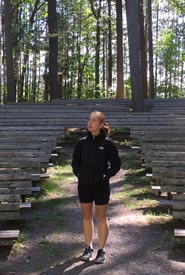Women in conservation: Hillary Page
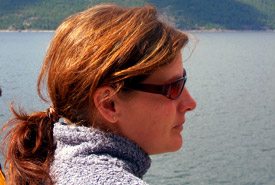
Hillary Page, director of conservation, BC Region (Photo by NCC)
In honour of International Women’s Day (March 8), we’re celebrating eight female conservationists at the Nature Conservancy of Canada (NCC) who are working to create a stronger future for Canada’s landscapes.
Starting high school can be one of the most intimidating trials in a young person’s life. But while most of her high school classmates were worrying about typical teenage problems, Hillary Page, director of conservation planning and stewardship at the Nature Conservancy of Canada’s (NCC’s) BC Region, was taking on the backcountry of the Columbia Valley in British Columbia.
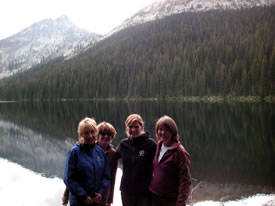
Ladies of NCC's BC Region: Linda Hannah, Trish Blackstock, Hillary Page and Nancy Newhouse. (Photo by NCC)
In Grade 9, Hillary’s dad took her on her first overnight hike to Lake of the Hanging Glacier in the Purcell Mountains. Sitting out under the stars, Hillary recalls the absence of the city’s racket and taking in the all-encompassing views from the peak they had hiked up. Cooking dinner on a cook stove, with items she had packed and hiked up with, felt like the neatest thing in the world to her. From that moment on, she was hooked on nature.
Read our interview with Hillary below:
RB: What did you study in school and where?
HP: I completed my undergraduate degree in conservation biology at the University of Alberta. I carried on there to do a master's in range and wildlife management.
RB: What was your first job in the environmental/conservation/science field? What did you learn in this position that has helped you now?
HP: My first job in the conservation science field was working for a PhD candidate who was studying carbon storage in the forest floor of different forest types in northern Saskatchewan and Manitoba. Here, I was properly introduced to field ecology and the whole host of questions that are waiting to be answered. Up until this point in my career, I had thought all trees were the same; I remember clearly learning the difference between fir trees and spruce trees. I also learned the value of proper documentation and writing things down. This field is all about observations, and you make so many in day that you will forget them if you do not document them properly.
RB: Describe a typical day at NCC for you.
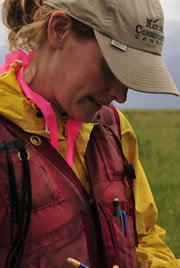
Hillary Page (Photo by NCC)
HP: There’s no such thing. A day can vary from a full day in the field, to writing a funding proposal, to meeting with our land management partners, to reviewing property management plans, to writing a natural area conservation plan….I can go on! This is the best part of the job for me: that there is no ”typical” day.
RB: Tell me about a time you consider to be your “best moment in science.” This could be a moment when you discovered something in nature, a moment when you saw a species or something you learned about yourself.
HP: It’s been (I almost hate to say it) 23 years since I spent that summer working in Northern Saskatchewan and Manitoba, and there are so many highlights. Working on Columbia Valley badgers with Nancy Newhouse, NCC’s senior director of conservation for the BC Region, and Richard Klafki, stewardship coordinator for NCC’s Canadian Rocky Mountain program, in my early 20s, checking duck nest boxes in the Columbia River wetlands, accompanying grizzly bear specialist Michael Proctor to look for grizzlies in the Selkirks and surveying for rare lichens with Trevor Goward in the Cummins River Valley...
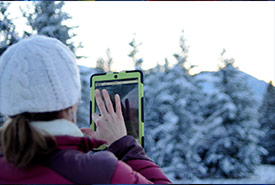
Hillary Page using an iPad in the field. (Photo by NCC)
However, my passion still lies with plants, and my favourite moments in “science” are times I’ve been able to sit with a hand lens and plant book and document all the plants around me. Try it one time: find a patch of ground, sit down and count all the different things you see. It’s amazing. My happy place is a hummocky bog full of cotton grasses, orchids and butterworts.
RB: Why is it important for women to be in science?
HP: Perspective is the first word that comes to mind. We all come to this with a different perspective. It will take all different types of people with diverse perspectives to wrap our heads around the challenges currently facing us. The more women in science and conservation, the more we will have to offer to finding solutions to current ecological issues.
RB: What advice do you have for women looking to make a career in the science or, more specifically, the conservation field?
HP: Find a skill and hone it. Become an expert at something, then use that skill to take you to different places. Don’t doubt your skills; you likely know more about certain topics than anyone else in the room and people are keen to hear what you have to say.

